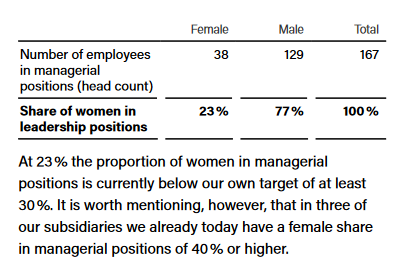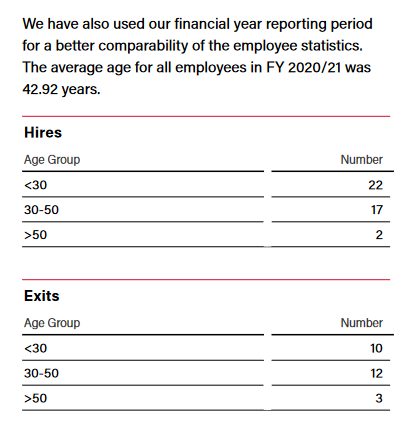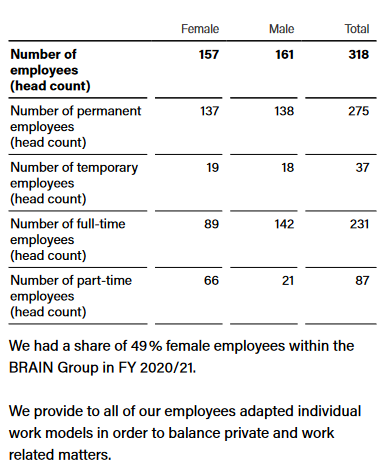14. Employment Rights
en
The company reports on how it complies with nationally and internationally recognised standards relating to employee rights as well as on how it fosters staff involvement in the company and in sustainability management, what goals it has set itself in this regard, what results it has achieved thus far and where it sees risks.
BRAIN operates in accordance with all legal requirements when it comes to employee rights. In addition, we have introduced several measures to foster employee engagement and sustainability aspects.
Our employees are absolutely crucial for our success. BRAIN Biotech is a science based business and our employees build the decisive factor to compete globally. It is important that we continuously hire and retain the best people for the job, inspire them to stay with us long term, and support their lifelong development. BRAIN desires to create an attractive, fair, and trusting work environment for all its employees. We employ local people strategies at all of our group subsidiaries and within our headquarter to acknowledge the different requirements of the individual business operations. Responsibility for defining and implementing group wide people initiatives lies with our Head of Human Resources (HR) at the headquarter in Zwingenberg, Germany, who directly reports to the CEO. Our Global People Strategy is built around the following pillars:
(1) engage employees,
(2) make the right resources available to support our business goals,
(3) continuously advance the BRAIN organization and
(4) foster excellent people practices.
In line with these priorities, we have launched the BRAINway program to foster intra-company exchange, enhance our corporate identity and internalize common goals.
We have formed a group-wide ESG/Sustainability Task Force consisting of employees across different functions and representing all group company members. There has been a strong commitment by our employees to participate and it has been great to see that many volunteered to be part on our journey to publish our inaugural sustainability report. There is a strong inherent believe within the organization that BRAIN really can make a positive impact. Within internal workshops the ESG/Sustainability Task Force has developed common themes which are material to our key stakeholders throughout the group.
BRAIN is about to establish an employee best idea contest on cost, energy savings and process optimization. We strongly believe that the best contributions for resource conservation will be generated by our own people. With this contest we want to further increase ESG engagement within our employees and accelerate the way to our targets. One concept which we already have realized is a “Job Bike” offering for many of our employees.
In its different entities the BRAIN group is either focusing on breakthrough innovations, contract research or the production of innovative customer solutions. In all areas it is of high importance for us to protect our employees and the environment from any potential hazards which might relate to our business activities.
The BRAIN group is internationally active in Continental Europe, UK, US and complies with all local labor regulations. We have identified no material risks from our business activities on employment rights.
We have defined the following social targets which incorporate employment related targets.
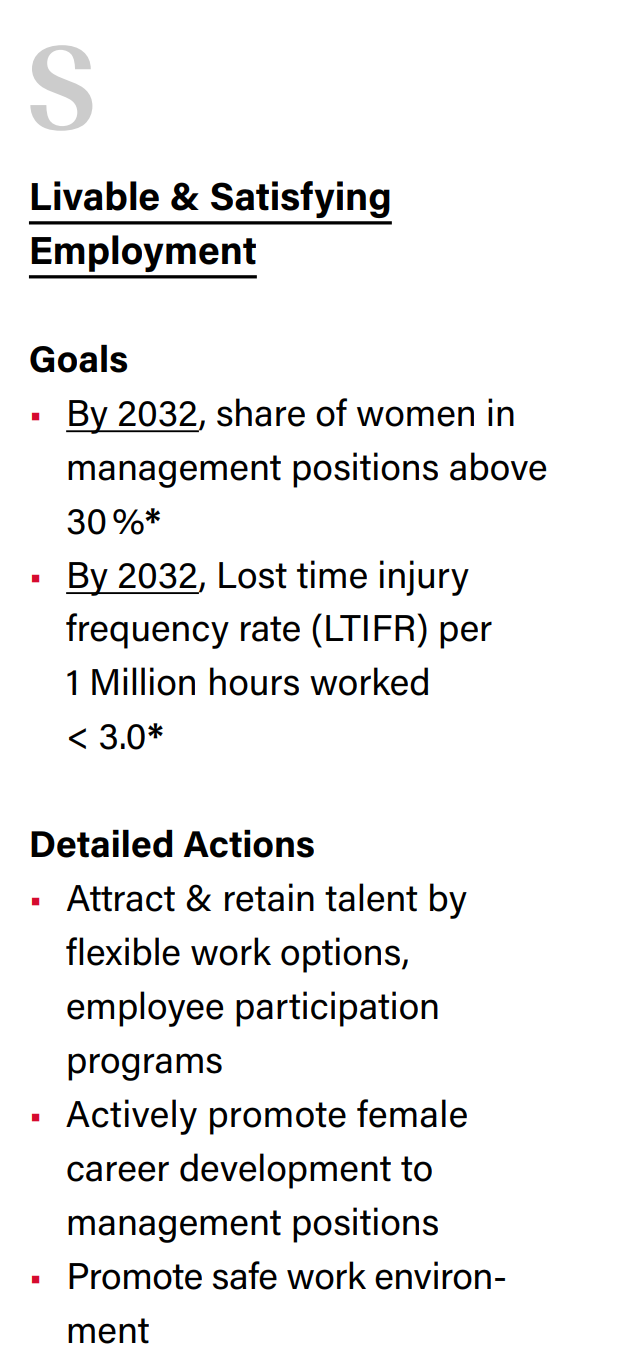
15. Equal Opportunities
en
The company discloses in what way it has implemented national and international processes and what goals it has for the promotion of equal opportunities and diversity, occupational health and safety, participation rights, the integration of migrants and people with disabilities, fair pay as well as a work-life balance and how it will achieve these.
The BRAIN group is an equal opportunity and equal pay employer.
We are about to implement during 2022 targets and schemes to develop a higher share of female employees into management positions. Female and male employees can take parental leave, financial support for childcare, generous leave arrangements in case of illness of children or care of relatives, flexible working models and mobile working arrangements. Part-time workers are involved in the same way as full-time workers.
Until now, we did not have any cross-group control mechanisms that captured employee diversity and equal opportunity. This has changed with the publication and work on our sustainability report and also the DNK reporting. In this context, a team was formed to monitor and document parameters such as the share of women in management positions in order to review this in the future and achieve the targets set. Our social targets are:
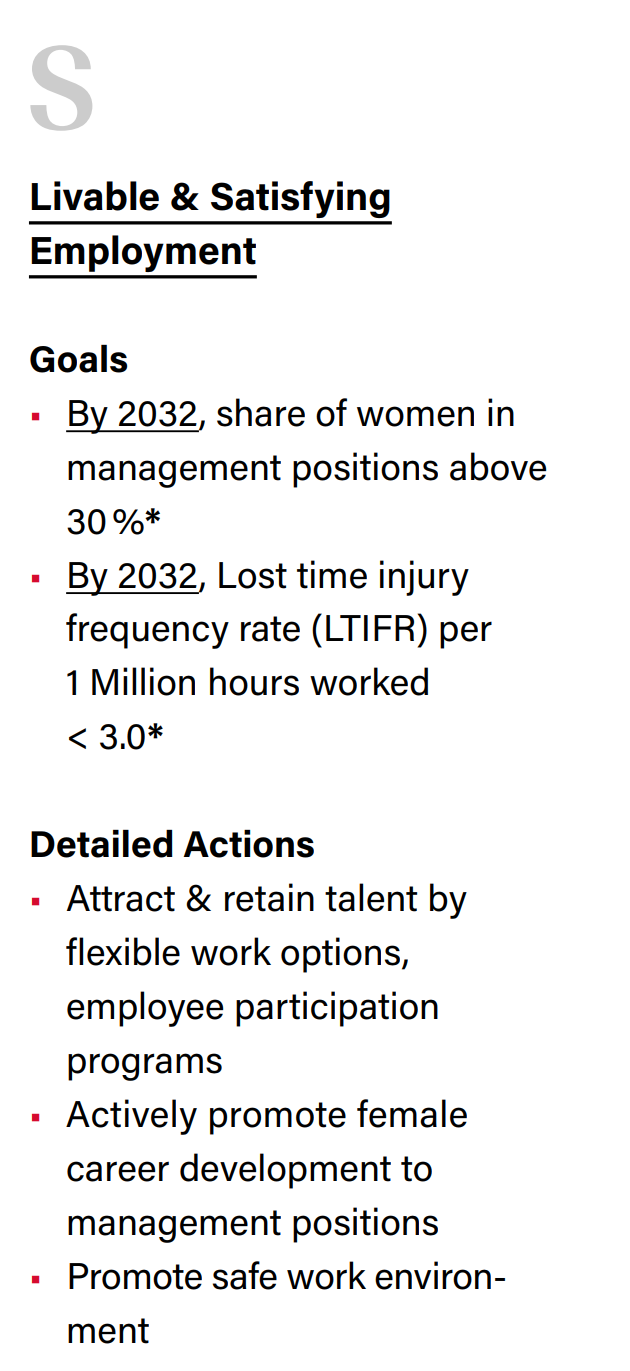
16. Qualifications
en
The company discloses what goals it has set and what measures it has taken to promote the employability of all employees, i.e. the ability of all employees to participate in the working and professional world, and in view of adapting to demographic change, and where risks are seen.
We consider the BRAIN group to be a knowledge driven enterprise. Our employees build the key differentiating factor for our competitiveness. Hence, talent recruiting and management play a key role in our corporate development. We have embedded a people strategy into our strategic planning process. Within our people strategy we set out the strategic direction of our employee development. It sets out the interventions that are required to ensure we develop as a company that is continuously fit for purpose, lives its values and delivers its objectives. It aims to systematically deliver on our vision & mission for BRAIN, create a high performance organization and lead this great workplace into a successful future. Our people strategy consists of five key elements which are built around BRAIN’s core values of collaboration across the group, safety & health, accountability, creativity & innovation, integrity & respect and sustainability. This five key elements are:
- Performance Management: incentivize innovation, retain and attract talent, build leadership skills
- Innovation Management: encourage pioneering ideas and commercialize the incubator pipeline
- Organizational Efficiency: lean management, flexible work arrangements and effective internal communication
- Personal Development: foster key training as well development needs, efficient succession planning
- Corporate Culture: agile, act around core values, great place to work
The group employes a very high proportion of skilled labor and promotes lifelong learning. Hence we see a positive impact from our operations on employee qualification.
For a detailed breadown of our staff by skill level, please refer to the Sustainability Data Sheet, Page 11:
https://www.brain-biotech.com/investors/esgThe BRAIN Group has formulated and published its Sustainability Targets in 2022 for the first times. Hence. no previous targets has been publically available.
Key Performance Indicators to criteria 14 to 16
en
Key Performance Indicator GRI SRS-403-9: Work-related injuries
The reporting organization shall report the following information:
a. For all employees:
i. The number and rate of fatalities as a result of work-related injury;
ii. The number and rate of high-consequence work-related injuries (excluding fatalities);
iii. The number and rate of recordable work-related injuries;
iv. The main types of work-related injury;
v. The number of hours worked.
b. For all workers who are not employees but whose work and/or workplace is controlled by the organization:
i. The number and rate of fatalities as a result of work-related injury;
ii. The number and rate of high-consequence work-related injuries (excluding fatalities);
iii. The number and rate of recordable work-related injuries;
iv. The main types of work-related injury;
v. The number of hours worked.
You will find the remaining numbers c-g of the indicator SRS 403-9 in the GRI standard and may additionally report them here.
Key Performance Indicator GRI SRS-403-10: Work-related ill health
The reporting organization shall report the following information:
a. For all employees:
i. The number of fatalities as a result of work-related ill health;
ii. The number of cases of recordable work-related ill health;
iii. The main types of work-related ill health.
b. For all workers who are not employees but whose work and/or workplace is controlled by the organization:
i. The number of fatalities as a result of work-related ill health;
ii. The number of cases of recordable work-related ill health;
iii. The main types of work-related ill health.
You will find the remaining numbers c-e of the indicator SRS 403-10 in the GRI standard and may additionally report them here.
a.
i. There have been no fatalities as a result of work-related injury.
ii. There have been no high-consequence work-related injuries.
iii. There have been 7 recordable work-related injuries.
iv. As the accidents were all of a different nature, no statement can be made on this subject.
v. 463,735.84 hours had been worked in 2020.
b. NA
2. a.-b.We have no record of work-related ill health reportings.
Key Performance Indicator GRI SRS-403-4: Worker participation on occupational health and safety
The reporting organization shall report the following information for employees and for workers who are not employees but whose work and/or workplace is controlled by the organization:
a. A description of the processes for worker participation and consultation in the development, implementation, and evaluation of the occupational health and safety management system, and for providing access to and communicating relevant information on occupational health and safety to workers.
b. Where formal joint management–worker health and safety committees exist, a description of their responsibilities, meeting frequency, decision-making authority, and whether and, if so, why any workers are not represented by these committees.
a.
| Type |
Description |
When? |
| Regular safety instructions |
Safety instructions according
to genetic engineering law |
every half year |
| Training as a specialist for occupational safety and safety officers |
Official occupational safety
specialist APUS
In addition, we have
2 internal specialists for
occupational safety
|
Always (internal specialisists)
|
| first-aiders+ trainings |
+fire protection, explosion
protection, handling gases,
handling hazardous materials,
lift maintenance |
refresher courses or
training of new employees if required |
b.
Due to the Corona pandemic, we have convened a special task force which meets once a week and shares the latest news and decisions with the employees (via Intranet and Newsletter).
The Covid task force consists of both management and employees from various groups.
For more detailed statistics please refer to our ESG data sheet at:
https://www.brain-biotech.com/investors/esg Key Performance Indicator GRI SRS-404-1: Average hours of training
The reporting organization shall report the following information:
a. Average hours of training that the organization’s employees have undertaken during the reporting period, by:
i. gender;
ii. employee category.
We have not measured this metric across the organization.
Key Performance Indicator GRI SRS-405-1: Diversity
The reporting organization shall report the following information:
a. Percentage of individuals within the organization’s governance bodies in each of the following diversity categories:
i. Gender;
ii. Age group: under 30 years old, 30-50 years old, over 50 years old;
iii. Other indicators of diversity where relevant (such as minority or vulnerable groups).
b. Percentage of employees per employee category in each of the following diversity categories:
i. Gender;
ii. Age group: under 30 years old, 30-50 years old, over 50 years old;
iii. Other indicators of diversity where relevant (such as minority or vulnerable groups).
Key Performance Indicator GRI SRS-406-1: Incidents of discrimination
The reporting organization shall report the following information:
a. Total number of incidents of discrimination during the reporting period.
b. Status of the incidents and actions taken with reference to the following:
i. Incident reviewed by the organization;
ii. Remediation plans being implemented;
iii. Remediation plans that have been implemented, with results reviewed through routine internal management review processes;
iv. Incident no longer subject to action.
a.-b.
The company is not aware of any incidents of discrimination during the reporting period
17. Human Rights
en
The company discloses what measures it takes, strategies it pursues and targets it sets for itself and for the supply chain for ensuring that human rights are respected globally and that forced and child labour as well as all forms of exploitation are prevented. Information should also be provided on the results of the measures and on any relevant risks.
The BRAIN Group is a signature member of the UN Global compact which includes an ethics codex on human rights which we follow.
The BRAIN group generally has a low risk on misconduct in respects to human rights as:
- our service and production operations are all located within the developed world: Europe, UK and the US.
- around 90% of our supply chain is located within the developed world and mostly with large or global partners
- we have established additional supply chain standards on the individual entity levels
- we employ almost entirely highly skilled and skilled labor
Due to the above we view the risks to negatively affect human rights from our operations as to be very low and to be not material fro our business.
As 2022 marks the first year of our sustainability reporting no previous targets have been communicated.
BRAIN considers the risk of human rights violations in our company to be very low. This applies for our labor practises as well as for our products. Hence, this is a sustainability topic which is not in our focus. Hence, no goals have yet been formulated in this context.
Key Performance Indicators to criteria 17
en
Key Performance Indicator GRI SRS-412-3: Investment agreements subject to human rights screenings
The reporting organization shall report the following information:
a. Total number and percentage of significant investment agreements and contracts that include human rights clauses or that underwent human rights screening.
b. The definition used for ‘significant investment agreements’.
The BRAIN Group is a signature member of the UN Global compact and follwos the UN Code of Conduct in regards to human rights.
We have in general a low risk of human rights violations as all of our production assets and the vast majority of our business activities is centered around the developed and highly indutrialized world. Our business activities as well as operations are focused on Continental-Europe, UK and US.
To our best knowledge where have been no direct violations in the reporting year on human rights issues.
On the supply chain
We buy laboratory and raw materials, utiilize these to create our services and manufacturing process up to the finished product.
We aspire to build sustainable and stable relationships with our suppliers. We prefer partners and suppliers with high own environmental and social standards. Information regarding specific supplier violations is reported and investigated directly. If confirmed, an action plan is prepared to mitigate the topics or to search for alternative sources.
Most purchasing decisions are done at the level of the individual operating unit but it is intended to increasingly centralize purchasing especially in the BioIndustrial segment. This will not only unify standards but also allow to increasingly harvest economies of scale. Close to 90% of our BRAIN Group product sourcing is executed within the EU, UK, US and other developed countries with high labor and social standards. Most of this from large or multinational suppliers. Only around 10 % of our sourced products are originated from emerging markets (mostly China) with the relative share of these purchases decreasing during the last years. Emerging market sources require our special attention when it comes to supply chain standards, especially on human rights.
Biocatalysts utilizes a standardized Supplier Approval Questionnaire (SAQ) for all of its suppliers. The SAQ is also employed for SEDEX (Supplier Ethical Data Exchange) or equivalent certifications. In addition, Biocatalyst enforces supplier risk assessment, approval and monitoring procedures.
WeissBiotech utilizes the EcoVadis rating for its supply chain analysis and scorecard.
Within the framework of the NATRUE certification L.A. Schmitt checks for the sustainable supply of natural raw materials for the production of cosmetics.
Key Performance Indicator GRI SRS-412-1: Operations subject to human rights reviews
The reporting organization shall report the following information:
a. Total number and percentage of operations that have been subject to human rights reviews or human rights impact assessments, by country.
As our operations are taking part in the developed world, human rights audits are not material for BRAIN and have not been conducted.
Within the supply chain we have taken the measures mentioned above.
Key Performance Indicator GRI SRS-414-1: New suppliers subject to social screening
The reporting organization shall report the following information:
a. Percentage of new suppliers that were screened using social criteria.
Due to the diverse nature of our business each of our entities has its own supplier management. We have taken the following precautionary measures:
Close to 90% of our BRAIN Group product sourcing is executed within the EU, UK, US and other developed countries with high labor and social standards. Most of this from large or multinational suppliers.
Biocatalysts utilizes a standardized Supplier Approval Questionnaire (SAQ) for all of its suppliers. The SAQ is also employed for SEDEX (Supplier Ethical Data Exchange) or equivalent certifications. In addition, Biocatalyst enforces supplier risk assessment, approval and monitoring procedures.
WeissBiotech utilizes the EcoVadis rating for its supply chain analysis and scorecard.
Within the framework of the NATRUE certification L.A. Schmitt checks for the sustainable supply of natural raw materials for the production of cosmetics.
Key Performance Indicator GRI SRS-414-2: Social impacts in the supply chain
The reporting organization shall report the following information:
a. Number of suppliers assessed for social impacts.
b. Number of suppliers identified as having significant actual and potential negative social impacts.
c. Significant actual and potential negative social impacts identified in the supply chain.
d. Percentage of suppliers identified as having significant actual and potential negative social impacts with which improvements were agreed upon as a result of assessment.
e. Percentage of suppliers identified as having significant actual and potential negative social impacts with which relationships were terminated as a result of assessment, and why.
This statistic has not been conducted in the past. We plan to upgrade data gathering and reporting for the future.
18. Corporate Citizenship
en
The company discloses how it contributes to corporate citizenship in the regions in which it conducts its core business activities.
The different entities of the BRAIN Group support their local communities via various fundraising and social activities.
BRAIN Zwingenberg: founding member of the Kulturstiftung (Arts Foundation) Bergstrasse, grants to local Youth Fire Department, local Red Cross. Offering educational opportunities to undergraduate and graduate students.
Analyticon Discovery: donations to regional associations with a focus on biodiversity and social youth programs.
Biocatalysts: engagement into ad-hoc fund raising, for example, “jeans for genes.” Offering charity giving salary sacrifice opportunities.
Key Performance Indicators to criteria 18
en
Key Performance Indicator GRI SRS-201-1: Direct economic value generated and distributed
The reporting organization shall report the following information:
a. Direct economic value generated and distributed (EVG&D) on an accruals basis, including the basic components for the organization’s global operations as listed below. If data are presented on a cash basis, report the justification for this decision in addition to reporting the following basic components:
i. Direct economic value generated: revenues;
ii. Economic value distributed: operating costs, employee wages and benefits, payments to providers of capital, payments to government by country, and community investments;
iii. Economic value retained: ‘direct economic value generated’ less ‘economic value distributed’.
b. Where significant, report EVG&D separately at country, regional, or market levels, and the criteria used for defining significance.
For a convenient overview please view our Sustainability Data Sheet, Pages 3-6,
https://www.brain-biotech.com/investors/esg
19. Political Influence
en
All significant input relating to legislative procedures, all entries in lobby lists, all significant payments of membership fees, all contributions to governments as well as all donations to political parties and politicians should be disclosed by country in a differentiated way.
The group does not directly support any political parties but engages in different lobby activities via the participation in industry associations and lobbying organizations. Our focus is built around the important social topics of the biologization of industrial processes, bioeconomy, biotechnology, enzymes, circular economy and, in addition, local or national industry associations.
The mother company BRAIN Biotech AG is member of:
- DECHEMA
- Bio Deutschland
- NatLife 2020
- ZeroCarb FP
Key Performance Indicators to criteria 19
en
Key Performance Indicator GRI SRS-415-1: Political contributions
The reporting organization shall report the following information:
a. Total monetary value of financial and in-kind political contributions made directly and indirectly by the organization by country and recipient/beneficiary.
b. If applicable, how the monetary value of in-kind contributions was estimated.
The group does not directly support any political parties but engages in different lobby activities via the participation in industry associations and lobbying organizations. Our focus is built around the important social topics of the biologization of industrial processes, bioeconomy, biotechnology, enzymes, circular economy and, in addition, local or national industry associations.
The mother company BRAIN Biotech AG is member of:
- DECHEMA
- Bio Deutschland
- NatLife 2020
- ZeroCarb FP
20. Conduct that Complies with the Law and Policy
en
The company discloses which measures, standards, systems and processes are in place to prevent unlawful conduct and, in particular, corruption, how they are verified, which results have been achieved to date and where it sees there to be risks. The company depicts how corruption and other contraventions in the company are prevented and exposed and what sanctions are imposed.
Good Corporate Governance involves responsible, value-based and sustainable corporate management and control. This includes the efficient cooperation between the Management Board and the Supervisory Board, respect for the interests of employees and shareholders, open and transparent communication as well as an appropriate approach to risk. This directly contributes to SDG BRAIN is targeting full operational alliance with all legal requirements and its own values. In addition, it is absolutely key for our business success to protect our Intellectual Property. To achieve this we have defined in our ESG Objectives Roadmap 2032:
Detailed Actions
- Further evolution of Financial Control Framework (FCF)
- Pro-active IP filing & trade secret strategy to enhance and manifest IP position
Goals
- By 2032, Target zero fines from compliance & operational breaches
- Ongoing, significantly increase share of milestone and royalty income in BioScience in relation to revenues
The group engages in regular training sessions for all of its employees on compliance topics, data protection laws and workplace safety. All new employees have to complete an initial training and have to complete a standardized onboarding procedure.
Compliance BRAIN has a legally trained internal compliance officer who conducts regular compliance trainings, monitors all compliance relevant processes and interacts with the respective authorities. The company has also established a whistle blower framework and will further adjust this to the upcoming new legal requirements. The compliance officer advises the board in coordination with investor relations on all potentially insider related matters. In addition, for science topics the company has established educational measures and checks to comply with laboratory and genetic regulations.
Tax Strategy BRAIN Biotech believes its obligation as a responsible taxpayer is to comply with the tax legislation of the countries in which it operates and pay the right amount of tax at the right time. BRAIN does not only aim to comply with the letter of the law, but also with its spirit. BRAIN uses business structures that are aligned with business activities and that are driven by commercial considerations. BRAIN only makes use of tax incentives where they are (i) aligned with business activities and operational objectives, (ii) generally available to all market participants and (iii) specified by law. As such, tax strategy always follows the business decision. BRAIN pays tax on profits according to where value is created within the normal course of its business activities. BRAIN does not use aggressive tax planning strategies or tax havens to minimize its tax burden. The transfer pricing of intercompany transactions is done in accordance with the arm’s length principle developed by the OECD and is applied consistently throughout the group. BRAIN maintains an open and constructive dialogue with tax authorities based on transparency and trust. BRAIN engages with them in honesty, integrity and respect.
Key Performance Indicators to criteria 20
en
Key Performance Indicator GRI SRS-205-1: Operations assesed for risks related to corruption
The reporting organization shall report the following information:
a. Total number and percentage of operations assessed for risks related to corruption.
b. Significant risks related to corruption identified through the risk assessment.
We follow a strict no bribery policy.
The BRAIN Group has established efficient internal compliance and financial controlling with its BRAIN Financial Control Framework and BRAIN Red Book as mandatory guidelines for all group companies. Compliance is controlled by our finance department, our compliance officers, external audit as well as monthly and/or quarterly monitoring meetings.
A whisteblower process has been established.
A strict four-eye principal is applied to all financial payments.
In the reporting year we have not identified any major risks in this area. All group companies were monitored for corruption risk.
Key Performance Indicator GRI SRS-205-3: Incidents of corruption
The reporting organization shall report the following information:
a. Total number and nature of confirmed incidents of corruption.
b. Total number of confirmed incidents in which employees were dismissed or disciplined for corruption.
c. Total number of confirmed incidents when contracts with business partners were terminated or not renewed due to violations related to corruption.
d. Public legal cases regarding corruption brought against the organization or its employees during the reporting period and the outcomes of such cases.
We had no incidents in the categories a.-d.
Key Performance Indicator GRI SRS-419-1: Non-compliance with laws and regulations
The reporting organization shall report the following information:
a. Significant fines and non-monetary sanctions for non-compliance with laws and/or regulations in the social and economic area in terms of:
i. total monetary value of significant fines;
ii. total number of non-monetary sanctions;
iii. cases brought through dispute resolution mechanisms.
b. If the organization has not identified any non-compliance with laws and/or regulations, a brief statement of this fact is sufficient.
c. The context against which significant fines and non-monetary sanctions were incurred.
We had no material fines for the non-compliance with law and/or regulation in the reporting year. Within our ESG targets we target a zero material fine rate also for the future.


